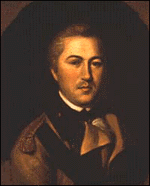After the surrender at Appomattox, Robert E. Lee took up life as a civilian for the first time. He was offered (and accepted) the presidency of tiny Washington College in Lexington, Virginia. By all accounts, he adapted well to academic life and before his death in 1870 had reversed the school's declining fortunes. Many of his students were veterans of the Army of Northern Virginia seeking a new start in a South ravaged by war and tormented by the harsh realities of Reconstruction.

Henry "Light Horse Harry" Lee |
||
Lee left no memoirs of his own but spent the last years of his life editing a new edition of those written by his father -- Memoirs of the War in the Southern Department of the United States. Better known as "Light Horse Harry," Henry Lee was a hero of the Revolutionary War remembered as much for his military dash and daring as for the phrase with which he eulogized his commanding general, George Washington: "First in war, first in peace, first in the hearts of his countrymen." Always better at military matters than financial dealings, Harry's real estate speculations brought ruin upon himself and his brother Richard Lee (who was forced to sell his plantation home at Sully to pay off his creditors), and he was thrown into debtors' prison in 1808. It was during this period of forced inactivity that Harry wrote his memoirs. In 1812 he was injured during a riot in Baltimore while helping a friend protect his printing press from a mob; the following year he sailed to the West Indies, ostensibly to restore his health but more probably to escape further imprisonment for debt.
The care and raising of young Robert (who was only a year old when his father went to prison and six when he left the country) and his siblings were left to their mother, Ann Carter Lee, a strong-willed woman who shuttled her children between the homes of relatives and rented houses, existing largely on charity.
Light Horse Harry fell ill in 1816. When he realized his illness was terminal, he booked passage on a ship headed for home, but the anticipated reunion with his family never took place. His condition worsened during the voyage, and he was put ashore off the Georgia coast. Despite the best efforts of his devoted nurse (the daughter of his wartime compatriot Nathaniel Greene), Harry died and was buried on Cumberland Island. Robert, who was nine years old at the time, would not visit his grave until he was a grown man serving as an officer in the United States Army.
Although Harry had never played a significant role in Robert's life, Lee nevertheless loved and admired his father. When his life as a college president gave him the luxury of time, he edited and republished Harry's memoirs. First printed in 1812, they had been reissued by Lee's half brother (the eldest son of Harry's first marriage) in 1827. Lee's 1869 edition included a biography of his famous father.
The mountains mentioned in the title of this poem refer both to the mountains of North Carolina, where Lee had hoped to escape with the Army of Northern Virginia in the closing days of the War (Jefferson Davis vetoed the idea), and the mountains of the Shenandoah Valley, where Lee spent the last days of his life.

"Lee in the Mountains"